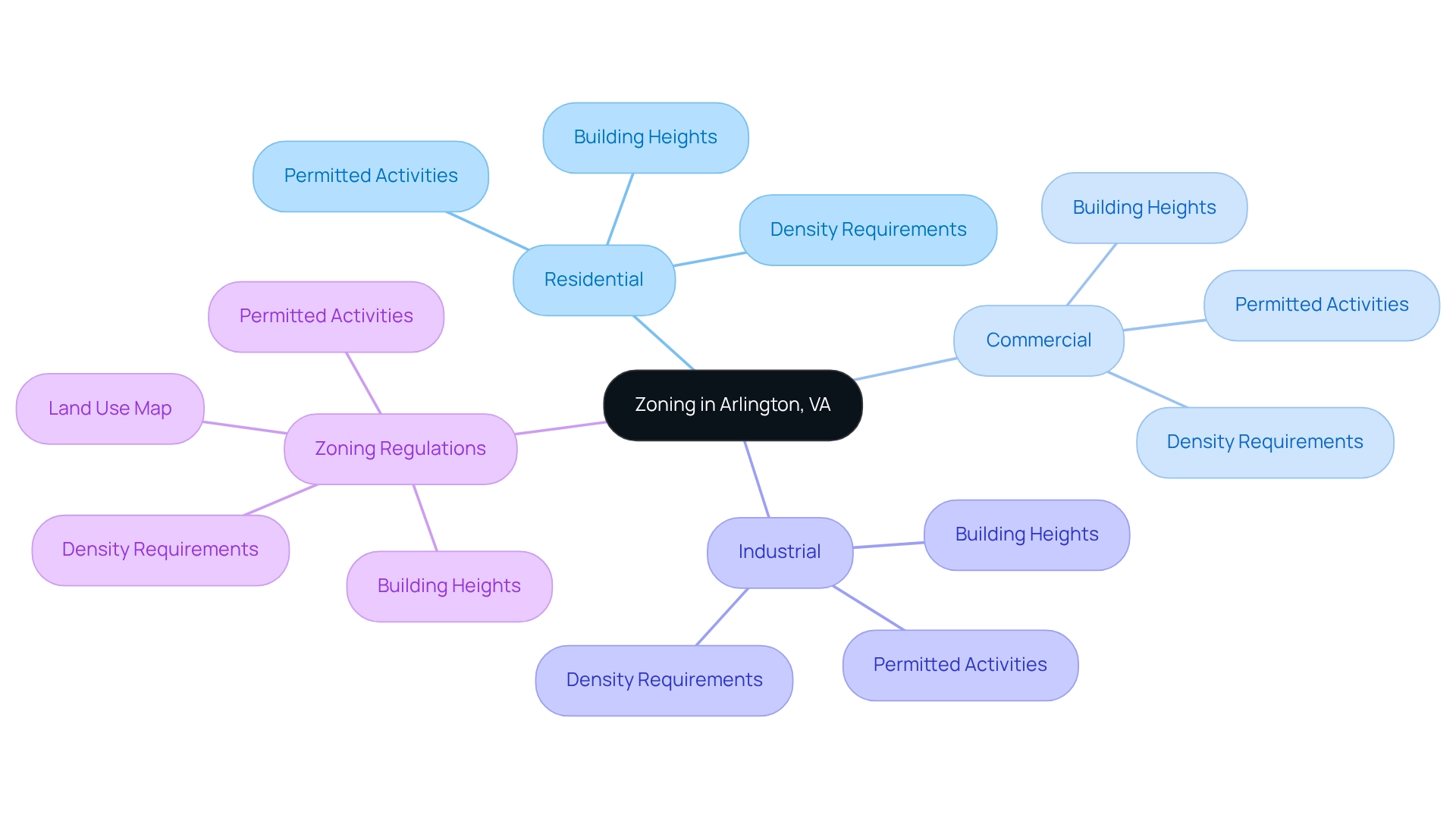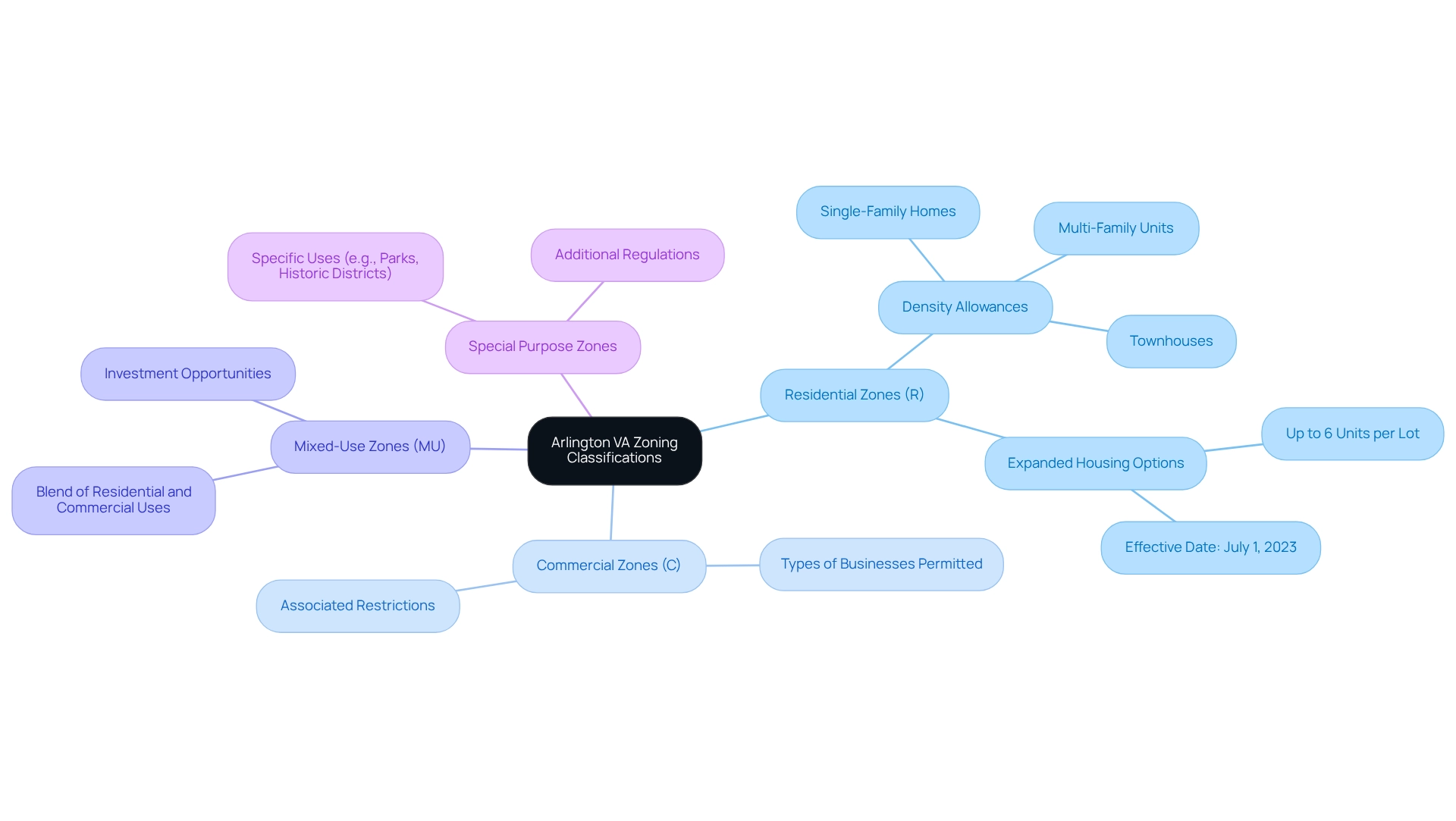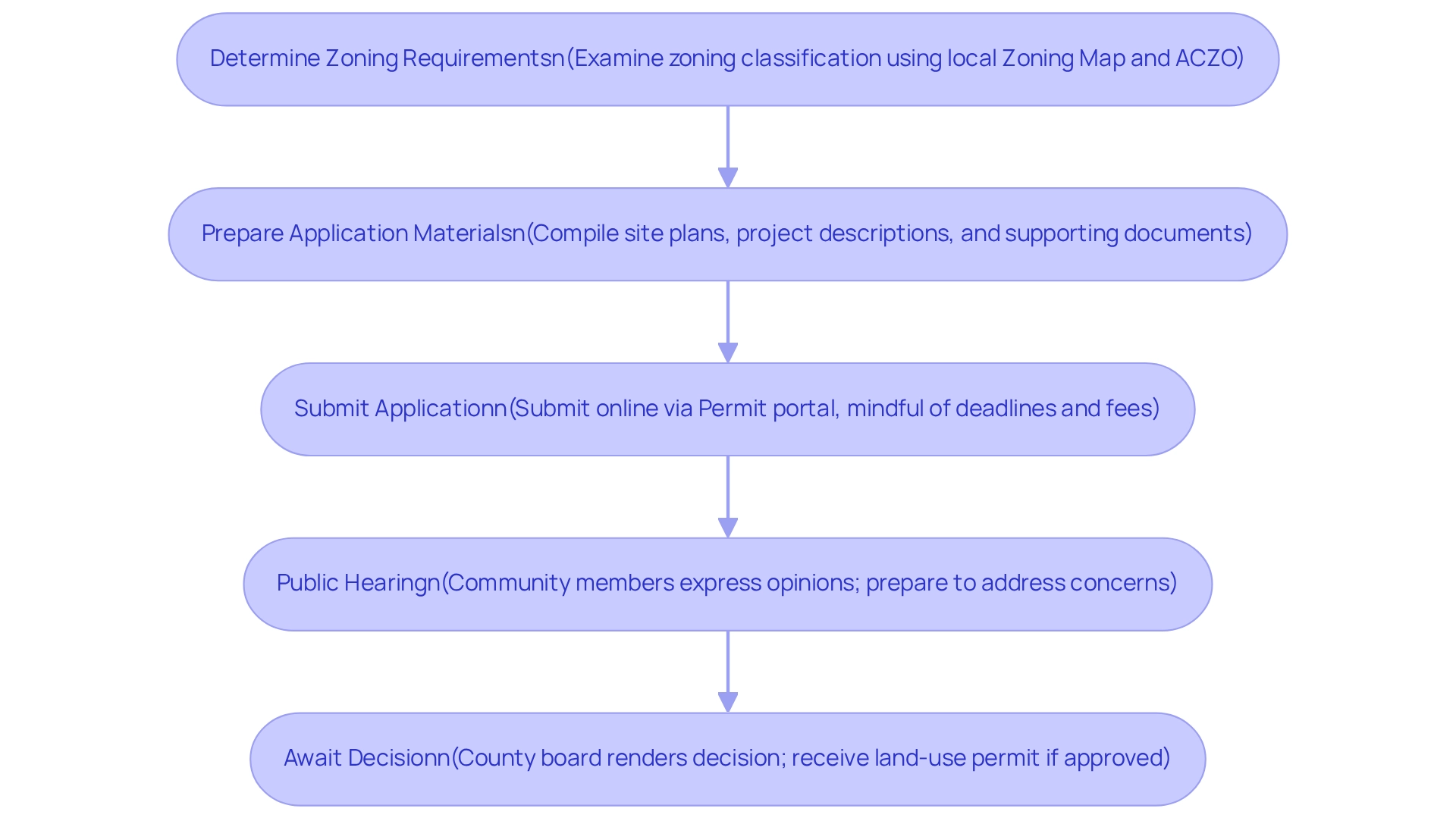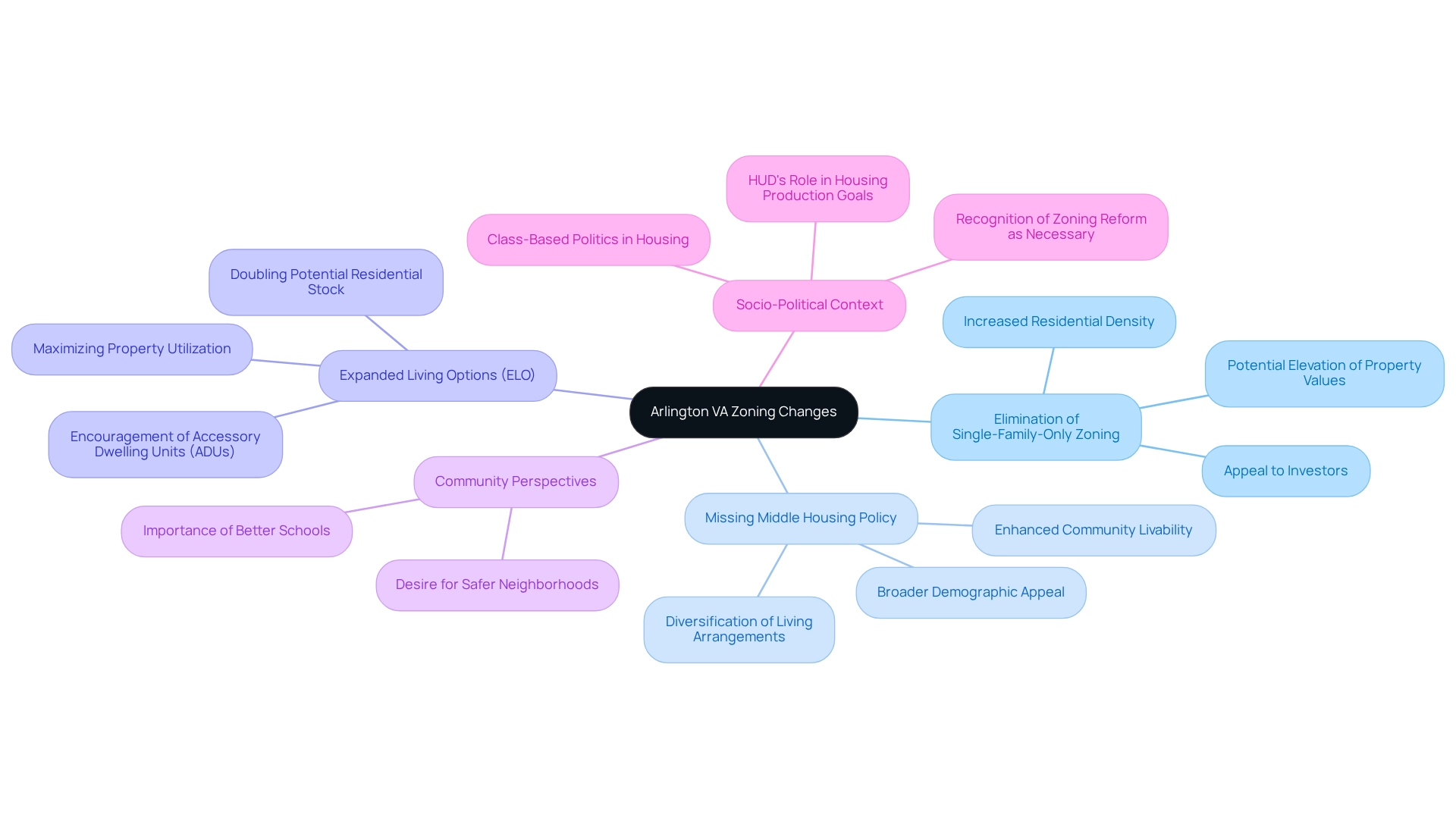Overview
This article delves into critical insights concerning zoning in Arlington, VA, specifically tailored for real estate investors. It underscores the necessity of comprehending local zoning regulations and classifications. By understanding the zoning landscape—including recent developments such as the removal of single-family-only zoning and the implementation of mixed-use and accessory dwelling unit policies—investors can make informed decisions that not only enhance property values but also capitalize on emerging development opportunities.
Introduction
In the bustling real estate landscape of Arlington, VA, zoning regulations are crucial in shaping land utilization and development. These regulations are designed to foster orderly growth while preserving the community's unique character. For investors navigating this dynamic market, understanding the intricacies of zoning is essential. The foundational purpose of zoning laws and the specific classifications that dictate property use can significantly influence investment strategies and property values.
Recent changes indicate a shift towards increased housing density and diverse living options. This evolution underscores the importance of staying informed about zoning practices and their impacts. For those seeking to capitalize on real estate opportunities in Arlington, being well-versed in these regulations has never been more critical.
Explore the Basics of Zoning in Arlington, VA
The zoning in Arlington VA zoning is governed by local regulations that dictate land utilization and development in the area. These regulations are designed to promote orderly growth and protect the community's character. Understanding Arlington VA zoning regulations is crucial for anyone interested in real estate opportunities in the area. They ensure that residential, commercial, and industrial areas are appropriately designated, effectively minimizing conflicts between different land uses. This structured approach not only preserves the community's integrity but also enhances property values, adhering to the Arlington VA zoning regulations outlined in the local County Zoning Ordinance (ACZO). This includes permitted activities, building heights, and density requirements, all of which are critical for prospective buyers and developers to understand.
Land Use Map: A visual representation of land classifications throughout the area, the Land Use Map assists buyers in determining the classification status of particular properties. This tool is invaluable for making informed investment decisions.
Grasping these fundamentals is the initial stage for individuals seeking to take advantage of real estate prospects in the area. By familiarizing themselves with Arlington VA zoning, potential investors can navigate the market more effectively and make strategic decisions.

Understand Zoning Classifications and Their Impacts
The Arlington VA zoning classifications encompass several categories, each with distinct regulations that significantly influence property values and investment opportunities, including residential zones (R) primarily designated for housing, which can include single-family homes, multi-family units, and townhouses. Investors must grasp the density allowances within these zones to make informed decisions about developing or acquiring residential properties.
- Commercial Zones (C): Tailored for business activities, these zones dictate the types of businesses permitted and any associated restrictions. Comprehending Arlington VA zoning regulations is essential for individuals seeking to capitalize on commercial real estate opportunities.
- The Mixed-Use Zones (MU) within Arlington VA zoning facilitate a blend of residential and commercial uses, presenting unique opportunities for investors to develop properties that serve both markets, thereby maximizing potential returns.
- Additionally, Special Purpose Zones in Arlington VA zoning, designated for specific uses such as parks or historic districts, often come with additional regulations that can affect development plans.
The implications of these classifications in Arlington VA zoning are profound, as they directly affect property value, development potential, and compliance requirements. For instance, the Arlington County Board's recent decision to expand housing options reflects a proactive approach to addressing the housing crisis, allowing for up to six units per residential lot in certain areas. This change, effective July 1, 2023, highlights the significance of staying updated about land use amendments and their potential effects on real estate investments.
As mentioned by Emily Hamilton, a senior research fellow, 'But just to say that things could be worse,' emphasizing the ongoing challenges and opportunities within the planning landscape. Moreover, the county commissions have been actively examining amendments to land use regulations, including Arlington VA zoning, suggesting that these discussions are continuing and pertinent to stakeholders. Comprehending these land-use classifications, particularly in relation to Arlington VA zoning, is crucial for individuals navigating the intricacies of the local real estate market, as they can greatly affect investment strategies and property valuations. With over 30,000 subscribers, Zero Flux provides valuable insights that can help investors stay informed about these critical developments.

Navigate the Zoning Application Process and Compliance Requirements
The land use application procedure in a Virginia city is meticulously organized to ensure transparency and compliance, comprising several essential steps:
-
Investors should begin by determining Arlington VA zoning requirements by examining the zoning classification of their property, utilizing the local Zoning Map and the County Zoning Ordinance (ACZO). Understanding these classifications is vital for aligning projects with Arlington VA zoning regulations.
Prepare Application Materials: This step involves compiling necessary documents such as site plans, project descriptions, and supporting materials. It is imperative that all submissions comply with local standards to avoid unnecessary delays.
-
Submit Application: Applications can be submitted online through the Permit portal. Investors must be mindful of submission deadlines and associated fees to ensure timely processing.
-
Public Hearing: Most applications require a public hearing, allowing community members to express their opinions. Investors should be prepared to address any concerns raised during this forum, as community support can significantly influence the outcome. The Chamber of Commerce emphasizes that robust discussions during these hearings can lead to more favorable outcomes for development initiatives.
-
Await Decision: After the public hearing, the county board will render a decision. If approved, stakeholders will receive a land-use permit, enabling them to advance their projects.
Understanding these phases is crucial for ensuring compliance and effectively navigating the regulatory landscape. The local Chamber advocates for the approval of changes to the Ordinance governing outdoor dining rules, highlighting the evolving nature of land use laws, particularly Arlington VA zoning, and their impact on stakeholders. Furthermore, the site plan review process in Virginia guarantees that all construction adheres to local standards, upholding quality and safety in urban development. Meetings regarding these processes occur at the APS Syphax Building and Conference Room 311 in Virginia, providing opportunities for stakeholders to engage with the community.

Analyze Recent Zoning Changes and Their Implications for Investors
Recent changes in Arlington VA zoning have ushered in transformative shifts in land use policies that are crucial for real estate investors to understand:
- Elimination of Single-Family-Only Zoning: This pivotal decision permits multi-family developments in areas previously restricted to single-family homes. By increasing residential density, this change not only tackles the urgent accommodation shortage but also has the potential to elevate property values in these neighborhoods, making them more appealing to investors.
- Missing Middle Housing Policy: This initiative emphasizes diversifying living arrangements, such as duplexes and triplexes, which can significantly enhance community livability. By catering to a broader demographic, this policy aims to create vibrant neighborhoods that appeal to various income levels and family structures. As observed in California, legislation permitting Accessory Dwelling Units (ADUs) in zones designated for single-family residences effectively doubles the potential residential stock, demonstrating the possible influence of comparable policies in Arlington.
- Expanded Living Options (ELO): The ELO program encourages the creation of accessory dwelling units (ADUs) and other innovative residential solutions. This method effectively doubles the potential residential stock in areas designated for single-family homes, presenting investors with unique opportunities to maximize property utilization and meet the growing demand for diverse living types. KiAra Cornelius, a Claims Analyst at United Healthcare, expressed a desire for suburban neighborhoods with less crime and better schools, highlighting the community's perspective on the importance of these housing changes.
Investors should closely examine these land-use changes, as they not only create new opportunities for development and investment but also necessitate strategic modifications to existing portfolios. Understanding the implications of these policies will be essential for navigating the evolving real estate landscape shaped by Arlington VA zoning. The dynamics of residential politics, as demonstrated in the case study 'Class-Based Politics in Housing,' indicate that backing for reform frequently corresponds with class interests, highlighting the socio-political context of these development reforms. Furthermore, the growing recognition of zoning reform as a necessary and achievable goal, along with HUD's potential role in developing outcome measures for housing production goals, underscores the importance of these changes in the broader housing landscape.

Conclusion
The intricate landscape of zoning regulations in Arlington, VA, plays a pivotal role in shaping the real estate market. Understanding the fundamentals of zoning, including its purpose and classifications, is essential for investors aiming to navigate this dynamic environment. The Arlington County Zoning Ordinance and the zoning map serve as critical tools for identifying land use opportunities and ensuring compliance with local regulations.
Recent zoning changes, such as the elimination of single-family-only zoning and the introduction of the Missing Middle Housing Policy, are transforming investment strategies. These developments not only address housing shortages but also enhance property values and diversify living options. Investors must remain vigilant and adaptable to these shifts, as they present both challenges and opportunities in a rapidly evolving market.
Moreover, mastering the zoning application process is vital for successfully executing real estate projects. By understanding the steps involved—from determining zoning requirements to engaging with community stakeholders—investors can better position themselves for favorable outcomes. The ongoing discussions surrounding zoning amendments highlight the importance of community involvement and the potential for positive change in urban development.
In conclusion, staying informed about Arlington's zoning practices is crucial for anyone looking to capitalize on real estate opportunities. As the landscape shifts towards increased density and diverse housing options, investors equipped with knowledge of these regulations will be better prepared to make strategic decisions that align with the community's evolving needs and aspirations.




